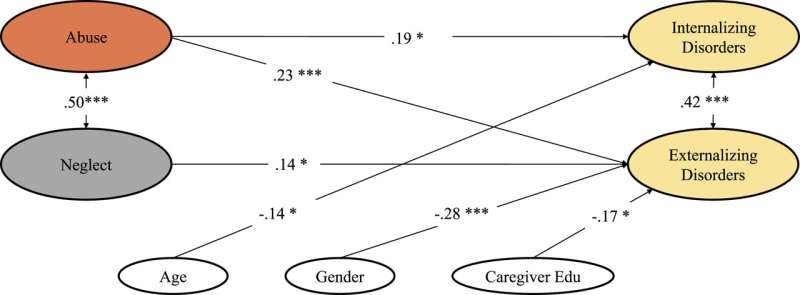This article has been reviewed according to Science X's editorial process and policies. Editors have highlighted the following attributes while ensuring the content's credibility:
fact-checked
trusted source
proofread
From emotional maltreatment to psychiatric disorders in childhood and adolescence

Emotional maltreatment, also known as psychological violence, is difficult to recognize and record both in research and in practice. That is why researchers at the Leipzig University Faculty of Medicine carried out a highly elaborate study on the psychological effects that abuse, neglect and emotional maltreatment have on children and adolescents. Examples of emotional abuse include when parents subject their children to extreme humiliation, threaten to put them in a home, or blame them for their own psychological distress or suicidal thoughts.
Physical violence between parents observed by children also plays a crucial role. "Our study findings clearly show that emotional maltreatment is not only a very common form of maltreatment, but also one with psychiatric consequences that are similar to or even more severe than other forms of maltreatment," explains study leader and last author Dr. Lars White, research group leader at the Department of Child and Adolescent Psychiatry, Psychotherapy and Psychosomatics at Leipzig University Hospital.
In their study of 778 children, the Leipzig researchers, together with researchers from other German universities, found that 80 percent of the children and adolescents who reported having been maltreated had also experienced emotional maltreatment. This makes emotional maltreatment the most common form of child abuse.
In addition, the researchers were able to show that, of all forms of maltreatment, emotional maltreatment had the strongest effects on the psyche of the children and adolescents, even in comparison with forms of maltreatment that normally receive much more attention, such as physical abuse. In younger children between the ages of three and eight, emotional maltreatment led primarily to behavioral problems, while in older children it was more likely to lead to depression and anxiety disorders.
The results have been published in the journal Child Maltreatment.
Study supported by youth welfare offices
Family data was collected by means of extensive interviews. In addition, the researchers analyzed files from youth welfare offices for evidence of maltreatment experiences. The sample consisted of 306 children and adolescents with, and 472 participants without, an experience of maltreatment. Among other sources, they were recruited via the residents' registration offices, day-care centers, child and youth psychiatry centers, and youth welfare offices in the cities of Leipzig and Munich.
"We are particularly grateful for the support of the youth welfare offices because this enabled us to recruit families for the study who have had extremely difficult experiences and who are otherwise difficult to reach for research projects," comments Dr. Jan Keil, lead author of the study and researcher at the Faculty of Medicine.
The findings illustrate that the risk of developing psychiatric disorders after maltreatment is already increased in early and middle childhood, which underlines the need for early intervention.
"We show that the form of emotional maltreatment, which includes emotional neglect of children, must be understood as a dimension of its own. There should be a greater focus on it both in research and in treatment, for example by pediatricians," says Dr. Franziska Schlensog-Schuster, lead author of the study, most recently a senior physician at Leipzig University Hospital and now head physician at the Universitäre Psychiatrische Dienste (UPD) in Bern, Switzerland.
As regards the everyday lives of families, psychologist Dr. White explains, "We need to educate parents so that they take the child's perspective more often. As recently as 30 years ago, the commonly held view was that children should be left to cry and that what they experience in childhood they forget anyway. But increasingly, there is a complete shift in attitudes and an appreciation that we need to reach out to the youngest children when they are showing difficult emotions, such as being angry or sad."
More information: Franziska Schlensog-Schuster et al, From Maltreatment to Psychiatric Disorders in Childhood and Adolescence: The Relevance of Emotional Maltreatment, Child Maltreatment (2022). DOI: 10.1177/10775595221134248



















